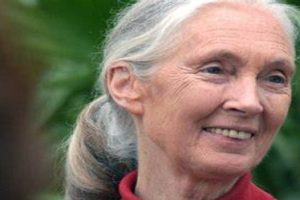
Unit 19
Jane Goodall
新知思想/閱讀種子
Travel Abroad/Travel strategy
BRAIN STORM
Share your ideas with your teacher and try to make sentences.
What do you think Jane Goodall is known for?
VOCABULARY
Repeat these sentences after your teacher.
1. conservationist (n.) (自然環境、野生動植物等)保護主義者
Jane Goodall was a conservationist.
2. foremost (adj.) 最重要的;最佳的;領先的
First and foremost, she was a Scientist.
3. primatologist (n.) 靈長類動物學家
Jane was an excellent primatologist.
4. binoculars (adj.) 雙筒望遠鏡
Do you have extra binoculars? Can I borrow them?
5. ventured off (phr.) 冒險
She left the city and ventured off on the forests.
6. groundbreaking (adj.) 開創性的
She made a groundbreaking discovery!
7. kinship (n.) 親緣關係
While in the forest, she missed kinship.
Dialogue
Read the dialogue aloud with your teacher.

Scientist, conservationist, peacemaker and mentor, Jane Goodall is still considered the world’s foremost expert on chimpanzees.
It was 60 years ago when the then 26-year-old Goodall embarked upon her life’s journey to become the most influential primatologist.
Equipped with little more than a notebook, binoculars, and her fascination with wildlife, she first ventured off into Tanzania’s Gombe Stream National Park.
What followed was nearly six decades of primate behavior research.
This research led to groundbreaking discoveries that revealed the genetic kinship that humans share with their closest living relatives.

In doing so, Jane Goodall also taught the world about the dire importance of primate habitat preservation and overall species conservation, which are both crucial components of environmental protection.
With the initial goal of increasing Gombe chimpanzee protection, in 1977 Goodall founded the Jane Goodall Institute, which today fights for primate protection around the globe.
Deemed a crusader for the ethical treatment of animals and a global force for compassion, Goodall’s conservationist and humanitarian efforts lead her to earn the title of UN Messenger for Peace.
Grammar
Participle clauses
In today‘s dialogue, we have “equipped with little more than a notebook” and “deemed a crusader.” “Equipped” and “deemed” are both past participles which modify “she” (Jane Goodall). And these two sentences are both participle clauses.
Participle clauses enable us to give information about the subject in a shorter way. For example, instead of saying, “He was angered by her comments, so he left the room,” one could say, “Angered by her comments, he left the room.” The participle clause “Angered by her comments” allows us to remove the conjunction. It also makes the sentence more dramatic.
We can use participle clauses when the participle and the verb in the main clause have the same subject. For example, Equipped with nothing, she went on the adventure. (Although she was equipped with nothing, she went on the adventure)
Participle clauses do not have a specific tense. The tense is indicated by the verb in the main clause.
Participle clauses are mainly used in written texts, particularly in a literary, academic or journalistic style.
1.Frightened by the wolf’s howling, the children ran off into the darkness of the night.
2.Respected by all for his courageous action, he was given the Man of the Year award.
3.Annoyed by the journalist’s questions, he refused to make a comment.
4._________________________________________________________.
DISCUSSION
Make a conversation with your teacher.
1.If you could be a great scientist like Jane Goodall, what programs will you make for the good of Nature?


